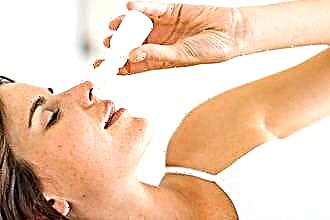Inflammation of the tonsils is always a consequence of an infectious lesion, which in the overwhelming majority of cases is of a bacterial nature. And the formation of pus on the surface of the tonsils, which, in fact, makes the sore throat purulent, serves as an indicator of the active course of this infection, the rapid and rapid multiplication of microorganisms. Therefore, the only truly effective treatment for purulent sore throat in both adults and children is antibiotics - an extensive class of drugs designed specifically to kill bacteria.
 It is impossible to cure purulent sore throat only with folk remedies! Without antibiotics, the risk of developing severe, sometimes life-threatening complications is extremely high. However, folk remedies can be a good adjuvant therapy. With their help, you can reduce the intensity of inflammation of the tonsils, provide a general disinfecting effect, relieve pain in the throat and improve the patient's condition.
It is impossible to cure purulent sore throat only with folk remedies! Without antibiotics, the risk of developing severe, sometimes life-threatening complications is extremely high. However, folk remedies can be a good adjuvant therapy. With their help, you can reduce the intensity of inflammation of the tonsils, provide a general disinfecting effect, relieve pain in the throat and improve the patient's condition.
Before using folk remedies for the treatment of purulent sore throat, you should also take care of creating special conditions for the patient.
Strict bed rest is recommended to him, it is necessary to limit his contact with others and ensure an increase in fluid intake. This will help remove toxins and reduce body temperature in the acute phase of the disease.
Medicinal herbs
Herbal preparations play, perhaps, the main role in folk remedies for the treatment of angina. Usually they are used for rinsing and inhalation. These techniques allow you to deliver active substances directly to the affected area - inflamed tonsils. In adults, the following recipes can be used:
- 1 spoonful of dry chamomile and 2 tablespoons of linden flowers, infuse for 30 minutes in 1 glass of boiling water;
- Boil 5 tablespoons of horsetail in 0.5 liters of boiling water and leave for 15-20 minutes;
- take 2 tablespoons of raspberry leaves in 1 cup of boiling water and leave for 10 minutes;
- Boil 3 tablespoons of onion husks in 0.5 liters of water, and then cool;
- you can also use herbs such as calendula, sage, St. John's wort, oregano, yarrow - their standard amount for the preparation of decoctions and infusions is 1 spoon per 1 cup of boiling water.
Another common and effective folk remedy for purulent sore throat is gargling with a mixture of 1 teaspoon of salt and baking soda, dissolved in one glass of water, with the addition of 10-12 drops of iodine.
Treatment of purulent sore throat with rinsing or smearing the throat with brilliant green will be ineffective. Brilliant green, although it is a powerful antiseptic, causes a severe chemical burn to the mucous membrane of the throat.
Cool and filter the above products before rinsing. And then perform the procedures as often as possible.
 In the optimal case, the break between them should not exceed 1 hour. If you have several solutions, it is recommended that you alternate them throughout the day. This will improve and enhance the overall therapeutic effect.
In the optimal case, the break between them should not exceed 1 hour. If you have several solutions, it is recommended that you alternate them throughout the day. This will improve and enhance the overall therapeutic effect.
When using inhalation, therapeutic compounds are delivered to the tonsils in the form of volatile substances along with steam. The solution should be strongly heated in a wide saucepan, bend over it and throw a large towel over your head so that it covers you and touches the table. Then begin to inhale vapors rising from the saucepan intensively through your mouth.
As a basis for inhalation in adults and children, you can use:
- the same herbal decoctions with which you wash your throat;
- solutions of essential oils;
- soda with salt and iodine;
- chlorophyllipt solution and other means.
Compresses and mustard plasters
The essence of the application of these methods of treatment is tissue heating. This enhances local blood flow, improving the elimination of toxins. But we must not forget that purulent tonsillitis is caused by an active bacterial infection. And for bacteria, additional heat will create suitable conditions for even more intensive reproduction. Therefore, compresses and mustard plasters on the neck with purulent sore throat are prohibited.
But on other areas of the body, such funds can be used - this will provide a general warming effect and stimulate immunity. So, for example, hot foot baths with mustard, compresses on the chest (in the absence of heart disease) or mustard plasters on the back will be useful.
Honey
Honey and bee products (for example, propolis) have a fairly strong anti-inflammatory and disinfectant effect. Therefore, they are widely used as an additional treatment in adults with purulent sore throat:
- Dissolve the same amount of honey and butter in a water bath in one container. Add 1 pinch of baking soda to 20 g of honey, heat the mixture and stir until foam forms. After cooling, take 1 spoonful of the mixture four times a day.
- Dissolve 1 spoonful of honey in 1 glass of warm water and add 1 spoonful of 6% vinegar there. Use a gargle mixture.
- Means for oral administration include a solution of honey and butter in milk.
Important! Beekeeping products often cause reactions of individual intolerance. Before using honey or propolis, you need to make sure that the patient is not allergic to them.
Oak bark
Oak bark, due to its high tannin content, is excellent against many types of bacteria. Treatment of angina in adults with this herbal preparation can be carried out using the following recipes:
- Take 2 parts calendula, 3 parts linden, 5 parts oregano, and 10 parts oak bark. Brew 1 spoonful of the mixture in 1 glass of boiling water and leave for 3-4 hours.
- Mix equal proportions of oak bark, sage, St. John's wort and elder flowers. Insist 2 tablespoons of the mixture in 1 cup of boiling water for 15-20 minutes.
- For 1 part of linden flowers, take 2 parts of oak bark and pour 2 tablespoons of this mixture with a glass of boiling water. The solution should be infused for at least 30-40 minutes.
- For 1 spoon of oak bark, take 0.5 liters of water and simmer the mixture over low heat for at least half an hour. Insist the broth warm for 2-3 hours.
All the above-described decoctions and infusions with oak bark should be cooled to room temperature and filtered before use for gargling.
Garlic
 The medicinal properties of garlic are based on the fact that it contains phytoncides - specific compounds of plant origin with pronounced antibacterial activity. As an adjunct treatment for purulent sore throat, garlic can be used in the following recipes:
The medicinal properties of garlic are based on the fact that it contains phytoncides - specific compounds of plant origin with pronounced antibacterial activity. As an adjunct treatment for purulent sore throat, garlic can be used in the following recipes:
- Insist 100 g of garlic gruel in 1 glass of water for 6 hours. Then heat the solution and gargle.
- Pour 1 crushed head of garlic with 2 tablespoons of vinegar. Soak the mixture in the refrigerator for half a day, then put 1 spoonful of honey there and take the mixture for 1 tsp. 2-3 times a day.
- Mix 8-10 minced garlic cloves with 3 tbsp. elder flowers and an equal volume of honey. Place this mixture in 0.5 liters of boiling water and heat for 2-3 hours. Then filter the resulting liquid and take 50 ml by mouth with a break of 1 hour.
- Pour 1 to 2 crushed garlic cloves in 1 cup of fresh carrot juice. This mixture should be drunk twice a day, half an hour before meals.
- Garlic gruel obtained from 1 head of garlic should be poured with 1 glass of hot water and infused for 30-40 minutes. Then take 1 large spoonful of this solution by mouth every hour.
The folk remedies for the treatment of sore throats even include the use of raw garlic. You just need to put 1 clove in your mouth and bite it from time to time.The juice that comes out will provide an adequate supply of phytoncides down the throat.
When using garlic or the mixtures in which it is included, the dosage of this product must not be exceeded. A large amount of it will cause severe burning in the larynx and its chemical burn.
Among other things, with purulent sore throat, folk remedies can also improve the functioning of the immune system. Here you will be helped by such well-known herbal remedies as tincture of ginseng, eleutherococcus or echinacea. We must not forget about the sufficient introduction of vitamin complexes into the patient's diet. For example, vitamin C is an important link in biochemical immune responses. It can be used both in the form of pharmacy ascorbic acid and in natural products - citrus fruits, apples, rose hips, sea buckthorn, black currant, etc.



